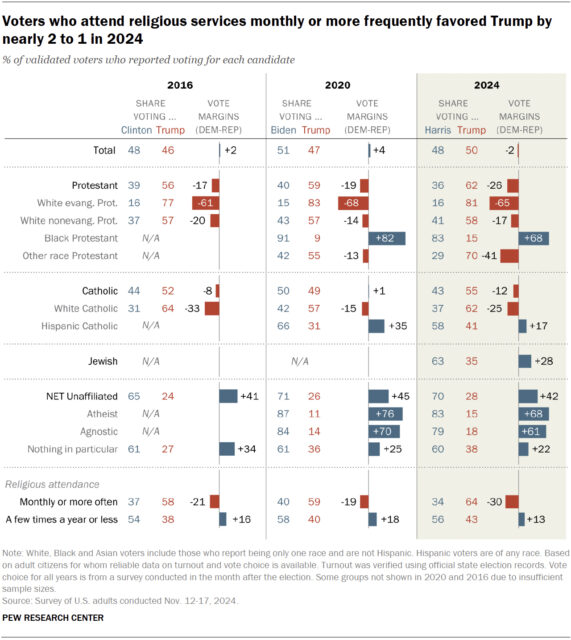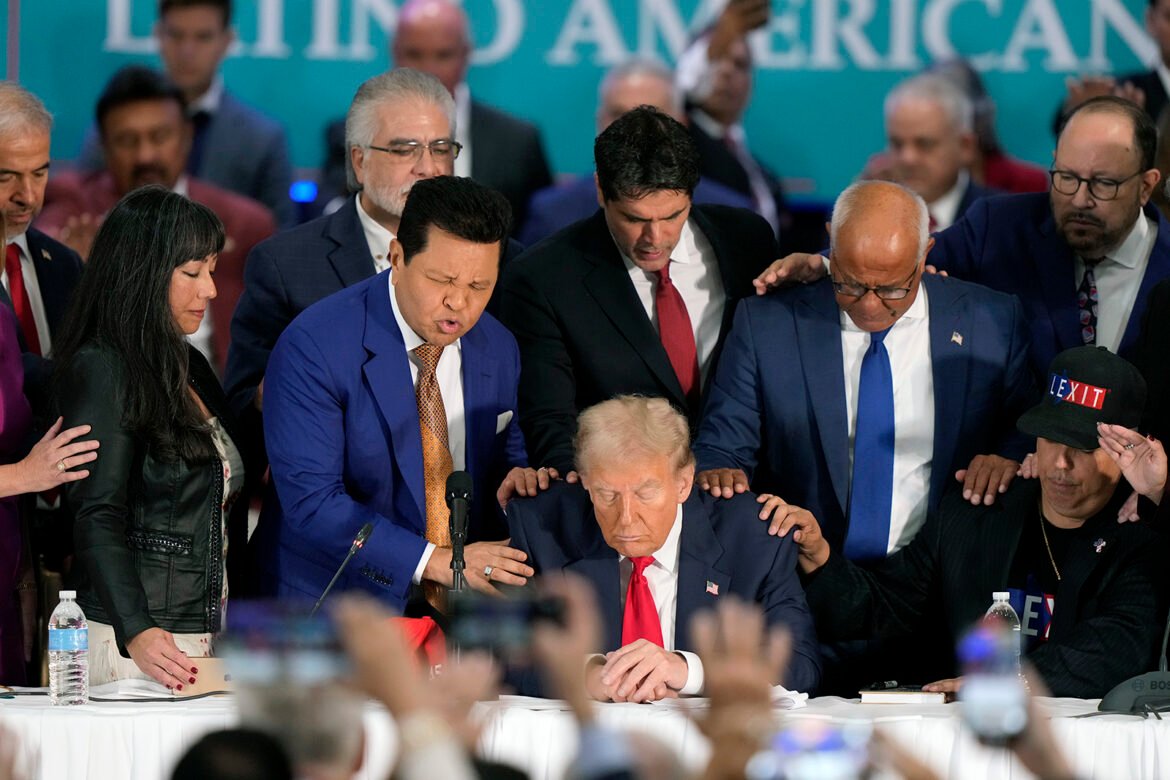(RNS) — White evangelicals’ love affair with Donald Trump has been well documented over the years, and their unflagging support for the president was no different in the 2024 election.
But a new study examining the 2024 vote among nearly 7,100 verified voters shows the president won over the affections of many other Protestants beyond evangelicals — and Catholics too.
The Pew Research poll released Thursday (June 26) shows that Trump bested his performance among all U.S. Protestants, winning 62% of their votes, up 3 percentage points from the 2020 election, when Trump lost to Joe Biden. And Trump won 55% of the Catholic vote, up 6 percentage points from 2020.
Most surprisingly, Trump did exceptionally well among minority race Protestants (a category that includes Hispanic and Asian Protestants, but not Blacks), winning 70% of their vote, up from 55% in 2020. He did better with Blacks too, winning 15% of the Black Protestant vote, up 6 percentage points over 2020. Still, overwhelmingly, Black Protestants voted Democratic.
“What the overall study shows is that Donald Trump was able to expand his coalition,” said John Green, emeritus director of the Bliss Institute of Applied Politics at the University of Akron. “He maintained his religious supporters among white Christians but then reached out particularly to the Hispanic and minority communities to really pick up some people.”
Unaffiliated voters, including atheists, agnostics and those who say they have no particular religious affiliation, overwhelmingly voted for the Democratic candidate, with 70% voting for Kamala Harris and only 28% for Trump.
RELATED: Prayer in school divides Americans as Texas law takes effect

“Voters who attend religious services monthly or more frequently favored Trump by nearly 2 to 1 in 2024” (Graphic courtesy Pew Research Center)
The study was made up of validated voters, meaning those who said they voted and were recorded as having voted in at least one of the three commercial voter files that Pew checked. (Exit polls, which are available almost immediately after the election, are considered less reliable because not all registered voters who said they voted actually voted.)
The Pew study also shows that in 2024 Trump won a larger share of voters who attend religious services monthly — 64%, up from 59% in 2020. People who attend religious services have proved to be reliable voters even as their proportion of the population continues to fall. Indeed, the study found that voters who attend religious services monthly favored Trump by nearly 2-to-1 in 2024 (64%-34%).
“The people remaining in religious institutions turn out to vote at much higher numbers,” said Green. “One reason is that voting behavior is communal. If the people I hang out with vote, I’m more likely to vote. It’s a connectedness phenomenon.”
Trump’s improving numbers among Catholics overall might be explained by the fact that there was no Catholic candidate in the presidential race this time. President Biden, who is Catholic, won 50% of the Catholic vote in 2020. In 2024, both presidential candidates were Protestant.

The Rev. Gabriel Salguero. (Photo courtesy of The Gathering)
But Trump’s vast improvement among nonwhite Protestants, especially Hispanic and Asian Protestants, is harder to understand given Trump’s promise of a crackdown on immigration.
Gabriel Salguero, president and founder of the National Latino Evangelical Coalition, said there were a host of issues that led Hispanic evangelicals to vote for Trump — among them, a more traditional understanding of marriage and sexual identity, a focus on economic issues and a belief that Trump would only go after immigrants who were violent criminals.
“It’s not one issue because Latino evangelicals are not one-issue voters,” said Salguero, who is a pastor of an Assemblies of God church in Orlando, Florida. “This list of issues, from the economy to social issues around pro-life, around biblical understandings of marriage, and in addition to the economic things, plus, the Trump administration was intentional in outreach to Latino evangelicals by going to their churches, having spots on their radio station, yielded an impact.”
Salguero said he will be looking to see how Latino evangelicals vote in the 2026 midterms.
Many of the larger demographic divisions that have characterized American politics for several decades also showed up in the study. Trump had a 14-point advantage among voters who did not attend college (56% to 42%), double his margin in 2016. He won voters living in rural areas by 40 points (69%-29%), higher than his margins in 2020 or 2016. And older voters favored Trump: 54% voted for Trump in 2024, compared with 52% in 2020. Younger voters tended to favor the Democratic candidate.
Among the 7,100 validated voters, the margin of error was plus or minus 1.5 percentage points.

Republican presidential nominee former President Donald Trump watches a video screen at a campaign rally at the Salem Civic Center, Nov. 2, 2024, in Salem, Va. (AP Photo/Evan Vucci)
RELATED: Christian broadcasters ask listeners to tune in to the fight for AM radio

